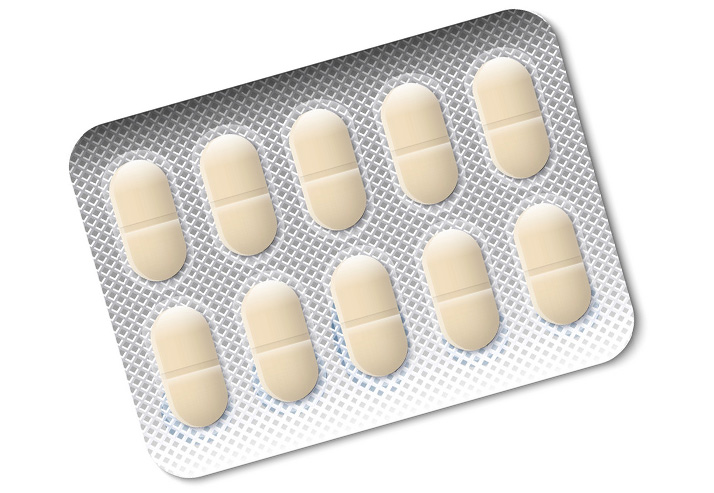Levaquin
Levaquin is a medicine for the treatment of bacterial infectious diseases.
Levaquin is a quinolone antibiotic and is effective against several types of bacteria.
This antibiotic is suitable for the treatment of adult infectious diseases such as:
- Kidney infections and complicated urinary tract infections.
For the following infectious diseases, Levaquin will be used as a second-line treatment, i.e. in cases where a first course of antibiotics has proved ineffective:
- Respiratory tract infections: acute sinusitis, acute exacerbation (worsening) of chronic bronchitis, community-acquired pneumonia.
- Complicated skin and soft tissue infections.
What Does Levaquin Contain?

Active ingredients
1 Levaquin film-coated tablet contains 250 mg or 500 mg of levofloxacin in the form of levofloxacin hemihydrate.
Excipients
Sodium stearyl fumarate, crospovidone, colloidal anhydrous silica, copovidone, microcrystalline cellulose.
Tablet coating: Lactose monohydrate, hypromellose, titanium dioxide, triacetin, red iron oxide (E172), yellow iron oxide (E172).
Forms and Strengths
Levaquin 250 mg: packs of 5, 7 and 10 film-coated tablets (scored).
Levaquin 500 mg: packs of 5, 7 and 10 film-coated tablets (scored).
Uses
Unless otherwise prescribed by a doctor, the following dosage applies to Levaquin:
Adults
500 mg Levaquin once daily without chewing with sufficient fluid.
Tablets should be taken at least 2 hours before or after the administration of: iron salts, zinc salts, antacids containing aluminium or magnesium, didanosine or sucralfates as a decrease in the effect of the antibiotic may occur.
Children and adolescents
Levaquin is not indicated for use in children and adolescents under 18 years of age.
As with all antibiotics, the dose and duration of treatment prescribed by the doctor must be strictly adhered to. Only then will Levaquin have its full effect. Even if you feel better, do not stop taking Levaquin prematurely, as symptoms often diminish before the infection is completely cured. Insufficient duration of use or premature discontinuation of treatment may lead to a recurrence of the infection.
Levaquin may be taken without chewing on an empty stomach with liquid or with a meal. The dosage of Levaquin is determined by your doctor, taking into account the sensitivity of the pathogen and the infected area.
Do not change the prescribed dosage on your own initiative. Talk to your doctor or pharmacist if you think your medicine is too weak or too strong.
If you miss a dose of Levaquin, take the tablet as soon as possible, provided it is not time for your next dose. If this is the case, take the prescribed dose and not double the dose, i.e. the missed tablet(s) will not be taken.
If you inadvertently take an extra tablet, you should not expect any adverse effects. However, if you have unintentionally taken several tablets too many, contact your doctor or pharmacist.
Side Effects
Common (affects 1 to 10 people out of 100)
Nausea, vomiting, diarrhoea, loss of appetite, digestive disorders, headache, dizziness, insomnia. If you experience severe or persistent diarrhoea during or after treatment, consult your doctor immediately. Do not attempt to treat diarrhoea yourself with antiperistaltic preparations (medicines that slow down intestinal contractions).
Occasional (affects 1 to 10 people in 1000)
Abdominal pain, anorexia, dyspnoea, certain mycoses, superinfections by resistant micro-organisms, drowsiness, tremor, anxiety, confusion, cramps, taste and smell disorders, tendon disorders (in very rare cases, tendon rupture such as injury and rupture of the Achilles tendon), muscle and joint pain, fever, drowsiness, dizziness, physical tiredness. Blood count disorders and changes in renal and hepatic function.
Allergic reactions, such as hypersensitivity reactions like skin rashes, including in the mouth (stomatitis), itching or urticaria. Skin reactions following exposure to the sun or artificial ultraviolet light (solarium).
Rare (affects 1 to 10 people in 10,000)
Depression, hearing disorders (tinnitus), visual disorders (blurred vision), memory disorders, delirium, hallucinations, paranoia, agitation, abnormal dreams, nightmares, suicidal thoughts, suicide attempts, muscle weakness, hypoglycaemia (cases of hypoglycaemic coma) and hyperglycaemia, e.g. in diabetics, convulsions, tachycardia, heart rhythm disturbances, syncope (circulatory collapse), tingling, fatal cases of acute liver failure, acute kidney failure, severe allergic reactions such as oedema of the face, tongue and epiglottis.
Ligament rupture, muscle rupture and arthritis.
Well-defined red patches on the skin, with or without blisters, may develop within hours of administration of levofloxacin and heal with discolouration. If you take levofloxacin again, spots may appear again in the same places.
eVery rare (affects less than one person in 10,000)Severe allergic reactions such as skin rashes, palpitations, hypotension (with loss of consciousness and shock) and respiratory distress or difficulty. In these cases, Levaquin should be discontinued immediately and medical treatment (e.g. shock therapy) is required.
Very rarely, peripheral nerve damage and involuntary or abnormal movements have been observed. Cases of increased intracranial pressure have been reported. In the eye, uveitis (inflammatory disease of the interior of the eye) has been observed very rarely. If vision is disturbed or any other visual effects occur, consult an eye specialist immediately.
Very rare cases of persistent (lasting several months or years) or permanent side effects, such as inflammation of tendons, rupture of tendons, joint pain, pain in the limbs, difficulty in walking, abnormal sensations such as tingling, prickling, tickling, burning sensation, Depression, fatigue, sleep disorders, memory disorders, as well as disorders of hearing, sight, taste and smell, have been associated with the administration of quinolone and fluoroquinolone antibiotics, sometimes independently of pre-existing risk factors.
Cases of widening and weakening of the aortic wall or tearing of the aortic wall (aneurysms and dissections), which may rupture and be fatal, and leakage of heart valves have been reported in patients receiving fluoroquinolones.
Certain medicines belonging to the same class as Levaquin may cause acute porphyria in patients suffering from this disease. This may also occur during treatment with Levaquin.
Isolated cases
Bullous skin reactions, such as Stevens-Johnson syndrome or toxic epidermal necrolysis (potentially fatal). Symptoms of a bullous cutaneous reaction include severe disturbance of the general state of health, high temperatures, painful pustules in the mouth, throat and genital area, and severe conjunctivitis. In the event of such side effects, the doctor treating you should be informed immediately. Hypoglycaemic coma, hyperglycaemia, breakdown of muscle tissue, rupture of ligaments, arthritis.
You should also tell your doctor immediately if you experience heart rhythm disturbances, signs of inflammation of the pancreas (severe abdominal cramps, nausea and vomiting) or symptoms of hepatitis (inflammation of the liver). The first warning signs of hepatitis are fatigue, a feeling of weakness, malaise, lack of appetite, nausea or vomiting. Other signs include yellowing of the eyes (conjunctiva) or skin, or discolouration of the stools.
If you notice any side effects, please tell your doctor or pharmacist. This applies in particular to side effects not mentioned in this package leaflet.
Precautions
This medicine may affect reactions, driving ability and the ability to use tools or machines.
Fluoroquinolones, including Levaquin, can cause serious, potentially irreversible and incapacitating adverse reactions which may affect different organs in the same patient, either singly or simultaneously. These include pain in the tendons, muscles and joints of the upper and lower limbs, abnormal sensations such as tingling, pins and needles, difficulty walking, tickling, numbness or burning, sensory disturbances including disturbances of vision, taste, smell and hearing, memory problems, depression, intense fatigue and severe sleep disturbances.
These reactions may occur within hours or weeks of taking Levaquin. Patients of any age or with no pre-existing risk factors have developed these adverse reactions. Stop your treatment at the first sign or symptom of a serious side effect.
If you experience any of these side effects after taking Levaquin, contact your doctor immediately before continuing treatment. You and your doctor will decide whether to continue your treatment, also considering the use of another antibiotic.
Severe skin reactions have been reported in some patients. If you notice any skin and/or mucous membrane reactions, contact your doctor immediately before continuing your treatment.
In the event of hypersensitivity or allergic reactions, discontinue your treatment and contact your doctor.
Fluoroquinolones such as Levaquin may cause convulsions or lower the convulsion threshold. If convulsions occur, discontinue treatment with Levaquin immediately and consult your doctor.
Particularly close monitoring is necessary in patients at risk of epileptic seizures (e.g. with a lowered seizure threshold, a history of seizures, reduced cerebral circulation, altered cerebral structure, after head trauma, intracranial infectious process or cerebral infarction) or in cases of myasthenia gravis.
Psychiatric reactions (e.g. nervousness, agitation, insomnia, anxiety, nightmares, paranoid thoughts, confusion, tremors, hallucinations and depression) may also occur when fluoroquinolones such as levofloxacin are taken for the first time. In very rare cases, a worsening of depression or psychotic reactions has been observed, leading to suicidal ideation or risky behaviour such as suicide attempts. You should be particularly vigilant if you have had or are suffering from mental disorders. If these symptoms occur, stop your treatment immediately and talk to your doctor.
When renal function is limited (renal failure), your doctor will adjust the daily dose.
The concomitant use of iron salts, zinc salts, didanosine (only formulations of didanosine with buffer substances containing aluminium or magnesium), sucralfate or medicines that reduce gastric acidity (such as antacids containing magnesium or aluminium) should be avoided, as they may reduce the effectiveness of Levaquin. These medicines should therefore be taken 2 hours after Levaquin.
The occurrence of diarrhoea during or after treatment with Levaquin, especially if severe, persistent and/or bloody, may be due to Clostridium difficile infection. If such a complication is suspected, discontinue Levaquin immediately.
If diarrhoea occurs, no medication should be taken that slows down intestinal peristalsis (movement of the intestine).
Heart rhythm disorders may occur, especially in patients with known risk factors, such as the elderly or women. Heart rhythm disorders may also occur if you suffer from an untreated electrolyte imbalance, if you have or have had heart problems, or if you are being treated with certain substances known to prolong the QT interval (antiarrhythmics, certain antidepressants including tricyclic antidepressants, macrolides or antipsychotics).
In the eye, uveitis (inflammatory disease of the inside of the eye) has been observed very rarely; if vision is disturbed or any other visual effects occur, consult an eye specialist immediately.
Because of the high risk of bleeding, coagulation parameters must be monitored during simultaneous treatment with Levaquin and vitamin K antagonists (blood-thinning drugs).
Concomitant use of certain drugs such as theophylline or fenbufen (or other similar drugs indicated for rheumatic and inflammatory diseases) may increase the risk of epileptic seizures.
Caution should be exercised when taking cimetidine (an inhibitor of gastric acid secretion) and probenecid (an anti-gout medication) at the same time, as the blood level of the active substance in Levaquin may increase.
Levaquin may cause tendonitis up to and including rupture of the Achilles tendon, which may be bilateral, particularly in elderly patients over 60 years of age, in patients taking corticosteroids (e.g. prednisone or a similar substance) or in transplant patients. This side effect may occur bilaterally within 48 hours of starting treatment and up to several months after treatment has been stopped.
At the first sign of tendonitis, contact a doctor immediately and rest the affected limb to avoid damage to the tendon.
Before taking Levaquin, please tell your doctor if:
- You have ever been diagnosed with a dilated or "bulging" large blood vessel (aortic aneurysm or peripheral aneurysm of a large blood vessel);
- You have had a dissection of the aorta (a crack in the wall of the main artery) in the past;
- If you have been diagnosed with heart valve leakage (heart valve regurgitation).
If there is a family history of aortic aneurysm or dissection, congenital valve disease, or if you are aware of other risk or predisposing factors that contribute to the development of aortic aneurysm and aortic dissection—such as connective tissue disorders like Marfan's syndrome, Ehlers-Danlos syndrome, Turner's syndrome, or Sjögren's syndrome (an inflammatory autoimmune disease), along with conditions like Takayasu's arteritis, giant cell arteritis, Behçet's disease, hypertension, known atherosclerosis, rheumatoid arthritis (a joint disease), or endocarditis (an infection of the heart)—it is important to be vigilant about these potential health issues.
Moreover, should you encounter intense pain in your stomach, chest, or back, which could indicate an aortic aneurysm or dissection, it's critical to seek urgent medical care at the closest emergency department. This is especially important if you're currently receiving treatment with systemic corticosteroids, as your risk may be heightened.
If you start to suffer from sudden shortness of breath, especially when reclining, or observe swelling in your ankles, feet, or abdomen, or if you experience new heart palpitations (feelings of fast or irregular heartbeats), it's imperative to contact a healthcare professional without delay.
Photosensitivity reactions (redness of the skin, inflammation) have been observed in patients during extreme sun exposure. Extreme sun exposure or use of a solarium should be avoided during treatment with Levaquin and for up to 48 hours after treatment has been discontinued. If photosensitivity develops, treatment should be discontinued.
If you are being treated with a vitamin K antagonist (e.g. Warfarin) and are taking Levaquin, it is possible that your coagulation test values (PT/INR) may increase and bleeding may occur. Please tell your doctor or pharmacist if you are taking a vitamin K antagonist.
There is a risk of severe blood reactions in cases of glucose-6-phosphate dehydrogenase deficiency (an inherited metabolic disorder).
As with all antibiotics in this group, hypoglycaemic and hyperglycaemic disorders have been reported, most commonly in patients with diabetes treated with an oral hypoglycaemic agent (e.g. glibenclamide) or insulin and/or in elderly patients. Close monitoring of blood glucose levels is recommended in such cases. Treatment with Levaquin should be discontinued immediately if a patient develops blood glucose disturbances and should be replaced by another non-fluoroquinolone antibiotic.
Peripheral nerve damage has been reported during treatment with fluoroquinolones, including levofloxacin. Clinical symptoms vary from case to case and include sensomotor or sensory neurological deficits (e.g. pain, burning, numbness or weakness, tingling, loss of tactile, thermal or painful sensation in the limbs or conversely hypersensitivity). The onset of such neuropathies may be rapid. Please consult your healthcare professional immediately if you develop symptoms of neuropathy and discontinue your treatment. In this way, the potential risk of irreversible nerve damage can be reduced.
Fluoroquinolones should be avoided in patients with a history of peripheral neuropathy. If you experience neuropathic symptoms such as pain, burning, tingling, numbness or weakness, stop your treatment immediately.
If you experience severe, continuous or worsening pain in the stomach area or vomiting, seek medical advice immediately as this may be a sign of inflammation of the pancreas (acute pancreatitis).
Levaquin contains lactose monohydrate. If your doctor has told you that you are intolerant to certain sugars, contact him or her before taking this medicine.
What else do you need to consider?
Levaquin is not an antibiotic that is active against all micro-organisms that can cause infection. Using the wrong antibiotic or the wrong dose can cause complications. So never use it on your own initiative to treat other conditions or other people. Similarly, you should not use Levaquin for a recurrence of infection without consulting your doctor again.
When should Levaquin not be used?
Patients with a known or suspected hypersensitivity (allergy) to any of the components of Levaquin or to similar substances (consult your doctor) should not use Levaquin.
Levaquin should not be used in patients who have already experienced serious adverse reactions when taking Levaquin or other medicines of the same type. In such cases, patients should inform their doctor as soon as possible.
Patients who have experienced tendon pain during previous treatment with fluoroquinolone antibiotics should not use Levaquin, as taking Levaquin exposes them to the same risks (including tendon tears).
Levaquin should not be used by patients with epilepsy or when there is a history of injury to the central nervous system (e.g. after trauma to the skull and brain, after inflammatory processes that have affected the brain, after a stroke).
Use is not recommended in patients with a known history of myasthenia gravis (muscle weakness and fatigability). Levaquin may exacerbate muscle weakness in patients with myasthenia gravis.
Levaquin should not be administered to growing children and adolescents, or to pregnant or breast-feeding women.
Pregnancy and Breastfeeding
Levaquin should not be taken during pregnancy or while breast-feeding.
Kidney Infection
Kidney infection or pyelonephritis is one of the urinary tract infections that affect 1 in 3 UK people during their lifetime. Most often the result of untreated or poorly treated cystitis, it can cause a great deal of inconvenience. How can you recognise a kidney infection? How can it be treated?



